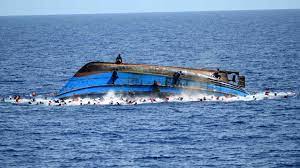The people of Mokwa, a riverine area in Niger State, along with all Nigerians, were plunged into mourning last Wednesday when a boat reportedly carrying over 300 passengers capsized. This tragic incident occurred around 8:30 PM as traders were returning from a market in Mundi on their way to Gbajibo in Mokwa Local Government Area. Initial reports indicated that local boat skippers and divers, in collaboration with the Niger State Emergency Management Agency (NSEMA) and the National Inland Waterways Agency (NIWA), managed to rescue over 100 victims. However, around 70 bodies were recovered during the grim night operation, while more than 100 individuals remain unaccounted for. Most of the victims were women and children, exacerbating the tragedy.
This incident follows another catastrophic boat accident in the same vicinity 18 months ago, which claimed over 200 lives, primarily those returning from a wedding celebration, with only 50 survivors. The recurring nature of such tragedies highlights a systemic issue in Nigeria’s waterways transportation.
Boat capsizings and mass drownings have become distressingly common in Nigeria’s riverine areas, especially during the rainy season when rivers swell and currents become treacherous. Despite frequent calamities, the communities in these geographical zones often fail to learn from past experiences. The primary cause of these disasters is typically overloading; passengers frequently insist on traveling in large groups without considering safety measures or weather conditions. Boat operators frequently disregard official capacity limits and safety protocols, often driven by the high cost of fuel, leading to further overloading of vessels.
A critical factor contributing to these tragedies is the widespread neglect of safety measures, particularly the use of life jackets. Waterway transportation in Nigeria remains one of the most underdeveloped and unregulated sectors, with NIWA— tasked with ensuring safety on the nation’s waterways— falling short of its responsibilities. As a result, boat operators often operate with impunity, leaving the vulnerable populations to bear the consequences.
In developed countries, transportation modes, including air, road, rail, and waterways, are regulated to ensure safety, resulting in far fewer fatal accidents. In stark contrast, Nigeria and many parts of Africa experience a primitive and neglected state of waterway transport, where governmental focus tends to prioritize air and road safety.
To prevent further tragedies, it is imperative that both the Federal and state governments, in collaboration with local authorities, community leaders, and waterway transport operators, enforce strict safety regulations. Safety cannot be solely the responsibility of the Federal Government; individuals must also take personal responsibility for their safety. Boat operators should be held accountable for their negligence in providing life jackets and ensuring vessels are not overloaded, especially when large numbers of women and children are involved.
The loss of life in these avoidable tragedies is unacceptable, and accountability must be prioritized to safeguard the lives of those who rely on waterway transportation. Without decisive action and a cultural shift towards prioritizing safety, the people of Mokwa and other riverine communities will continue to pay the price with their lives

